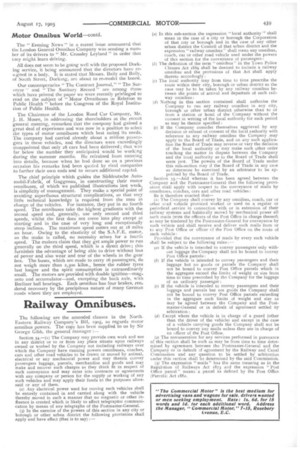Railway Omnibuses.
Page 5

If you've noticed an error in this article please click here to report it so we can fix it.
The following are the amended clauses in the NorthEastern Railway Company's Bill, igos, as regards motor omnibus powers. The copy has been supplied to us by Sir George Gibb, the general manager : Section 54.—(i) The Company may provide own work and use in any district or to or from any place situate upon railways owned or worked by the Company not including railways over which the Company have running powers omnibuses, coaches, cars and other road vehicles to be drawn or moved by animal, electrical or any mechanical power and may therein convey passengers luggage, parcels, merchandise and goods and may make and recover such charges as they think fit in respect of such conveyance and may enter into contracts or agreements with any company or person for the supply or working of any such vehicles and may apply their funds to the purposes aforesaid or any of them. (2) Any electrical power used for moving such vehicles shall be entirely contained in and carried along with the vehicle thereby moved in such a manner that no magnetic or other influence is created which is likely to affect telegraphic communication by means of any telegraphs of the Postmaster-General. (3) In the exercise of the powers of this section in any city or borough or other urban district the following provisions shall apply and have effect (that is to say) :—
(a) In this sub-section the expression " local authority '' shall mean in the case of a city or borough the Corporation of that city or borough and in the case of any other urban district the Council of that urban district and the expression "railway omnibus shall mean any omnibus, coach, car or other road vehicle used under the powers of this section for the conveyance of passengers:
(L) The definition of the term " omnibus" in the Town Police Clauses Act i889 shall be deemed to include a railway omnibus and the provisions of that Act shall apply thereto accordingly :
(co The local authority may from time to time prescribe the route within their city, borough or urban district as the case may be to be taken by any railway omnibus between the points of arrival and departure of such railway omnibus:
(di Nothing in this section contained shall authorise the Company to run any railway omnibus in any city, borough or other urban district otherwise than to or from a station or hotel of the Company without the consent in writing of the local authority for such period as may be therein specified (e) If the Company consider themselves aggrieved by any decision or refusal ot consent of the local authority with reference to any railway omnibus the Company may apply to the Board of Trade, and on any such application the Board of Trade may reverse or vary the decision of the local authority or may make such other order touching the matter in dispute between the Company and the lccal authority as to the Board of Trade shall seem just. The powers of the Board of Trade under this sub-section may if the Board of Trade in any case so determine be exercised by an arbitrator to be appointed by the Board of Trade.
Section 55.—And whereas it has been agreed between the Company and the Postmaster-General that the following provisions shall apply with respect to the conveyance of mails by omnibuses, coaches, cars and other road vehicles:
Be it therefore enacted that—
(1 he Company shall convey by any omnibus, coach, car or other icad vehicle provided worked or used on a regular or periodical service in connection with or in extension of their railway systems and habitually moved by mechanical power all such mails (witn the officers of the Post Office in charge thereof) may be tendered by the Postmaster-General for conveyance by such vehicle and shall receive and deliver such mails from or to any Post Office or officer of the Post Office on the route of such vehicle: Provided that the conveyance of mails by every such vehicle shall be subject to the following rules :— (ai If the vehicle is intended to convey passengers only without luggage the Company shall not be bound to convey Post Office parcels: (b) If the vehicle is intended to convey pas3engers and their luggage but no goods or parcels the Company shall not be bound to convey Post Office parcels which in the aggregate exceed the limits of weight or size from time to time prescribed by the Company for the luggage of an ordinary passenger: (c) If the vehicle is intended to convey passengers and their luggage and parcels but not goods the Company shall not be bound to convey Post Office parcels exceeding in the aggregate such limits of weight and size as may be agreed between the Company and the Postmaster-General or in default of agreement settled by arbitration:
(dl Except where the vehicle is in charge of a guard (other than the driver of the vehicle) and except in the case of a vehicle carrying goods the Company shall not be bound to convey any mails unless they are in charge of an officer of the Post Office.
(2) The remuneration for any services performed in pursuance of this section shall be such as may be from time to time determined by agreement between the Postmaster-General and the Company or in default of agreement by the Railway and Canal Commission and any question to be settled by arbitration under this section shall be determined by the said Commission.
(3) The expression " mails " has the same meaning as in the Regulation of Railways Act 1873 and the expression "Post Office parcel" means a parcel as defined by the Post Office (Parcels) Act 1882.
















